Migration is a natural law: everything moves, everybody migrates.
Respect the mobility of human life
Risk Change
Εργαστήριο/Workshop: The art of photography and migration
For English, please scroll down

Εργαστήριο: "The art of photography and migration” από τον Άγγελο Καλοδούκα, Φωτογράφο
Τρίτη, 22/10/2019, 15:00-18:00, στην αίθουσα Γκουνταρούλη του ΙΦΕ
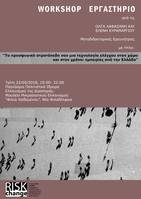
Workshop: "The art of photography and migration” by Aggelos Kalodoukas, Photographer
Tuesday, 22/10/2019, 15:00-18:00, Department of History and Philosophy of Science, 'Goudaroulis' Seminar Room, NKUA
20/11/2018
Εργαστήριο/Workshop: Science, Technology, Sustainability and Migration
For English, please scroll down
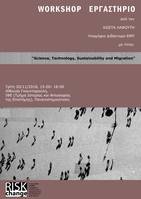
Εργαστήριο: "Science, Technology, Sustainability and Migration” από τον Κώστα Λατούφη, Υποψήφιο Διδάκτορα ΕΜΠ
Τρίτη, 20/11/2018, 15:00-18:00, στην αίθουσα Γκουνταρούλη του ΙΦΕ
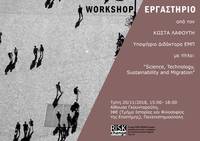
Workshop: "Science, Technology, Sustainability and Migration” by Kostas Latoufis, PhD candidate National Technical University of Athens
Tuesday, 20/11/2018, 15:00-18:00, Department of History and Philosophy of Science, 'Goudaroulis' Seminar Room, NKUA
11/12/2018
Εργαστήριο/Workshop: Science, Technology, Art and Migration - Towards the exchange of equality and the pacing of citizenship”
For english, please scroll down
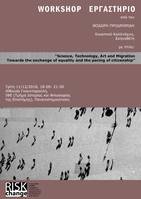
Εργαστήριο: "Science, Technology, Art and Migration - Towards the exchange of equality and the pacing of citizenship” από το Θοδωρή Προδρομίδη
Τρίτη, 11/12/2018, 18:00-21:00, στην αίθουσα Γκουνταρούλη του ΙΦΕ
Σε συνέχεια της έρευνάς του στο πλαίσιο του RiskChange, ο εικαστικός καλλιτέχνης και σκηνοθέτης Θοδωρής Προδρομίδης παρουσιάζει τα ερωτήματα που θέτουν το ερευνητικό πλαίσιο και τη μεθοδολογία για την δημιουργία μιας online κοινότητας μέσα από την κατασκευή ενός app για νέους “πολίτες εν αναμονή”
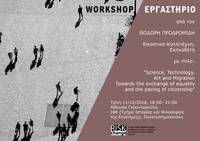
Workshop: "Science, Technology, Art and Migration - Towards the exchange of equality and the pacing of citizenship” by Theo Prodromidis
Tuesday 11/12/2018, 18:00-21:00, 'Goudaroulis' Seminar Room, Department of History and Philosophy of Science, NKUA
Following research in the framework of the Risk Change project, Theo Prodromidis, visual artist and director, introduces to questions of relevance to the research framework and the methodology required for the creation of an online community via an app for new "pending citizens".
03/10/2018
Workshop: Borders and technology in the Balkans/ Εργαστήριο: Σύνορα και Τεχνολογία στα Βαλκάνια
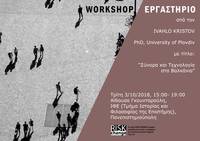 For English, please scroll down
For English, please scroll down
Εργαστήριο με θέμα Σύνορα και Τεχνολογία στα Βαλκάνια, Ivaylo Hristov, PhD, University of Plovdiv
Τετάρτη, 3 Οκτωβρίου 2018, ώρα 15:00-19:00, Αίθουσα Γκουνταρούλη, ΙΦΕ, ΕΚΠΑ
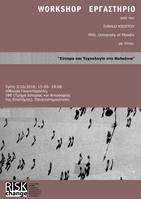
Workshop on Borders and technology in the Balkans, Ivaylo Hristov, PhD, University of Plovdiv
Wednesday, October 3, 15:00-19:00, Seminar room in the Department of History and Philosophy of Science of the National and Kapodistrian University of Athens
“Art, Technology, Borders and Migration” - Spring 2018 Program
For English, please scroll down
To Πρόγραμμα Creative Europe της ΕΕ “Risk Change: Respect the Mobility of Human Life”, στο οποίο συμμετέχει το Εθνικό και Καποδιστριακό Πανεπιστήμιο Αθηνών, απευθύνει ανοιχτή πρόσκληση για συμμετοχή στον κύκλο εργαστηρίων, διαλέξεων και εκθέσεων 2018-2019 με θέμα: «Τέχνη, Τεχνολογία, Σύνορα και Μετανάστευση». Ακολουθεί το πρόγραμμα του πρώτου κύκλου (Άνοιξη 2018), ο οποίος θα φιλοξενηθεί από το Παγκόσμιο Πολιτιστικό Ίδρυμα Ελληνισμού της Διασποράς (Π.Π.Ι.Ε.Δ.)-Μουσείο Μικρασιάτικου Ελληνισμού «Φιλιώ Χαϊδεμένου» και το Δήμο Νέας Φιλαδέλφειας-Νέας Χαλκηδόνας, στην αίθουσα διαλέξεων του Π.Π.Ι.Ε.Δ.
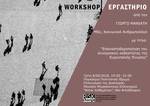
Τρίτη 8 Μαΐου2018, 19:00-22:00
Γιώργος Μανιάτης, MSc, Κοινωνικός Ανθρωπολόγος
Εργαστήριο: Επανασταθεροποίηση του συνοριακού καθεστώτος της Ευρωπαϊκής
Ένωσης: Χωρικές και κοινωνικές αντιφάσεις στην εφαρμογή της προσέγγισης HotSpot και της συμφωνίας Ε.Ε-Τουρκίας στα νησιά του Αιγαίου
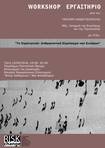
Τρίτη 15 Μαΐου 2018, 19:00-22:00
Γρηγόρης Πανουτσόπουλος, MSc, Ιστορικός της Επιστήμης και της Τεχνολογίας
Εργαστήριο: Το Στρατιωτικο-Aνθρωπιστικό Σύμπλεγμα των Συνόρων
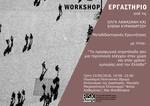
Τρίτη 22 Μαΐου 2018, 19:00-22:00
Εργαστήριο: Το προσφυγικό στρατόπεδο σαν μια τεχνολογία ελέγχου στον χώρο και στον χρόνο: εμπειρίες από την ΕλλάδαΌλγα Λαϕαζάνη, PhD, Μεταδιδακτορική ερευνήτρια, Ελένη Κυραμαργιού, PhD, Μεταδιδακτορική ερευνήτρια
To έργο RISK CHANGE (2016–2020) έχει διάρκεια 4 χρόνια και συγχρηματοδοτείται από το πρόγραμμα Creative Europe Programτης Ε.Ε.
The EU Creative Europe Program “Risk Change: Respect the Mobility of Human Life” (www.riskchange.eu), which involves a large consortium of European partners that include the National and Kapodistrian University of Athens, invites you to participate in a series of 2018-2019 events -workshops, lectures and exhibitions- that will be organized under the title “Art, Technology, Borders and Migration”. Attached you may find the program for the Spring 2018 events, which will be hosted by the Global Cultural Institution of the Hellenism of the Dispersion – Museum of Minor Asia Hellenism “Filio Haidemenou” (http://www.neafiladelfeia.gr/Default.aspx?pid=130) and the Nea Philadelphia – Chalkidona Municipality, at the lecture hall of the Museum.
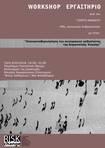
Tuesday, May 8, 19:00-22:00
Giorgos Maniatis, MSc, Social Anthropologist
Workshop: EU’s border regime re-stabilized? Spatial and social contradictions in the
implementation of the Hot Spot Approach and the EU-Turkey Deal at the Aegean islands
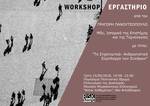
Tuesday, May 15, 19:00-22:00
Grigoris Panoutsopoulos, MSc, Historian of Science and Technology
Workshop: The Military-Humanitarian Border Complex
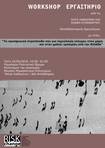
Tuesday, May 22, 19:00-22:00
Olga Lafazani, PhD, Postdoctoral researcher, Eleni Kyramargiou, PhD, Postdoctoral Researcher
Workshop: The refugee camp as a technology of control in time and space: experiences from Greece
RISK CHANGE Project (2016–2020) is a four-year project co-funded by the Creative Europe Program of the European Union.
Workshop on the RISK CHANGE mobile app
Workshop on the RISK CHANGE mobile app by Lars Maria Schnatmann at the Department of History and Philosophy of Science, National and Kapodistrian University of Athens on Friday 2.21.2020, Goudarouli Room
Participants includes department members and research affiliates, including Dr. A. Dermitzaki, museologist/historian, Dr. Anastasia Doxanaki, museologist/historian, Dr. George Zoukas, postdoctoral fellow in STS/HTS, Dr. Yiannis Koukoulas, art historian, anjunct faculty at the Athens School of Fine Arts, Kostas Sakalis, PhD candidate, Orfeas Menis, MSc in electrical engineering, Konstantinos Konstantis, MSc in electrical engineering).
Εργαστήριο/Workshop: The art of photography and migration
For English, please scroll down
Ο Άγγελος Καλοδούκας, φωτογράφος με ειδική εμπειρία στην κάλυψη του προσφυγικού, έχει μεγάλη εμπειρία στην φωτογράφιση ανθρώπων σε πολύ κακές συνθήκες. Με το έργο του έχει τοποθετηθεί σε ζητήματα όπως την ανάγκη σεβασμού πολιτισμικών/ηθικών διαφορών, την πιθανή αντιπαράθεση με τις αρχές (αστυνομία κ.λπ.) κατά τη διάρκεια της φωτογράφισης, τη δυσκολία έκδοσης απαραίτητων αδειών από τις αρχές, τη δυσκολία να έχεις τη συγκατάθεση του φωτογραφιζόμενου/ης και τα ιδιαίτερα ηθικά ζητήματα που σχετίζονται με την φωτογράφιση παιδιών. Κατά τη διάρκεια του εργαστηρίου που οργάνωσε στο ΙΦΕ, την Τρίτη 22 Οκτώβρη 2019, στο πλαίσιο της οποίας ρωτήθηκε για το πως ο τρόπος με τον οποίο φωτογραφίζει επηρεάζεται από τον λόγο της φωτογράφισης ή/και την επιδιωκόμενη χρήση (π.χ. για δημοσιογραφικό ρεπορτάζ, καταγραφή κατάστασης για λογαριασμό κάποιας ΜΚΟ, προσωπική επιλογή, κάτι άλλο), για το αν οι φωτογραφιζόμενοι/ες περιμένουν κάτι από αυτόν ή τις φωτογραφίες που θα δημοσιεύσει (π.χ. δημοσιοποίηση της κατάστασής τους, βελτίωση, κ.λπ.), για τα όρια της αποτύπωσης μιας τραγικής πραγματικότητας στο κάδρο της φωτογραφίας, για το ρόλο του θεατή της φωτογραφίας (γιατί η ίδια φωτογραφία -π.χ. τα σκουπίδια στους καταυλισμούς- μπορεί να προξενεί διαφορετικές αντιδράσεις σε εκείνους που τις βλέπουν ανάλογα με τις προκατασκευασμένες αντιλήψεις τους;), και, τέλος, για το αν ωφελεί ή, τελικά, κάνει κακό στους πρόσφυγες και μετανάστες η «εμμονή» των περισσότερων ΜΜΕ στην αποτύπωσή τους ως θύματα.

Aggelos Kaloudoukas, a photographer with great experience in covering refugees’ issues, has gain expertise in taking photos of people in dire conditions. In his work he has dealt with issues such as the need to respect cultural / ethical differences, possible confrontations with the authorities (police etc.), the difficulty of getting the necessary permits from the authorities for taking photos, the difficulty of obtaining the consent of the person to be photographed and the particular ethical issues associated with taking photos of children. During the workshop he organized in the Department of History and Philosophy of Science, on Tuesday October 22 2019, we discussed many issues, such as how his overall work is influenced by the purpose of the shooting or/and the use of the photographs (e.g. taking photos for a journalistic report, record of a situation on behalf of an NGO, personal choice, etc.); whether the people photographed expect something from him or the photos he publishes (e.g. introducing their situation to the wider public, improvement of their living conditions, etc.); about the limits of showing a tragic reality in the frame of a photo; about the role of the viewer of a photo (as the photo itself – e.g. the garbage in the camps – may produce different reaction from the ones who look at them according to their preconceived notions/ideas?); about whether it helps or damages refugees and migrants the persistence of the majority of the media to present them as victims.
Εργαστήριο/Workshop: Science, Technology, Art and Migration - Towards the exchange of equality and the pacing of citizenship
For English, please scroll down
Στο εργαστήριο του ο Θοδωρής Προδρομίδης, σκηνοθέτης, εικαστικός καλλιτέχνης, παρουσίασε την εν εξελίξει εργασία του για τα νέα μέσα επικοινωνίας, την άτυπη εκπαίδευσης, την κινητικότητα και την ιθαγένεια. Στόχος του είναι να αναπτύξει μια εφαρμογή που θα παρέχει ταυτόχρονη πρόσβαση σε διαδικτυακούς διαγωνισμούς ραπ. Άντλησε έμπνευση και υποστήριξη από έφηβους πρόσφυγες που βρίσκονται στην Ελλάδα.

Μια τέτοια εφαρμογή αντιμετωπίζει ζητήματα κοινωνικής ένταξης και συμμετοχής που αφορούν πολλούς νέους πρόσφυγες που τώρα βρίσκονται απομονωμένοι σε στρατόπεδα στην Ελλάδα. Τους δίνει τη δυνατότητα να αναπτύξουν αλληλεπιδράσουν διαδικτυακά καθημερινά με Έλληνες, να εκφράσουν τις αγωνίες και τις ελπίδες του και να δημιουργήσουν μια διαδικτυακή κοινότητα. Η υιοθέτησή της από πρόσφυγες και γηγενείς μπορεί να συμβάλει σε διαδικασίες άτυπης εκπαίδευσης, πολιτιστικής ένταξης και διαμόρφωσης νέων ιδεών για την ιθαγένεια.
In his workshop Theo Prodromidis, director, visual artist, presented his ongoing project that traverses new media, informal education, mobility and citizenship. He aims at developing an application that provides simultaneous access to online rap contests. He has drawn inspiration and support from teenage refugees in Greece.
 Such an application can address issues of social integration and participation of numerous young refugees that now live in isolated camps in Greece. It can enable them to develop everyday online interactions with Greeks, express their anxieties and hopes and foster the creation of an online community. Its endorsement by refugees and natives can contribute to processes of informal education, cultural integration and shaping new ideas about citizenship.
Such an application can address issues of social integration and participation of numerous young refugees that now live in isolated camps in Greece. It can enable them to develop everyday online interactions with Greeks, express their anxieties and hopes and foster the creation of an online community. Its endorsement by refugees and natives can contribute to processes of informal education, cultural integration and shaping new ideas about citizenship.
Εργαστήριο: Σύνορα και τεχνολογία στα Βαλκάνια/ Workshop: Borders and technology in the Balkans
For English, please scroll down
Στο εργαστήριο που διοργάνωσε o Ivaylo Hristov, ιστορικός σε θέματα συνόρων και τεχνολογίας, στις 3 Οκτωβρίου 2018 ανέλυσε τους κοινωνικο-ιστορικούς μετασχηματισμούς των τεχνολογικών συνόρων στη Βουλγαρία. Στα συμπεράσματά του υπογράμμισε τη σημασία της τεχνολογίας στον μετασχηματισμό της εθνικής ταυτότητας μιας χώρας και στο διεθνή προσανατολισμό της. Έτσι, τα σύνορα θα πρέπει να θεωρούνται τεχνικό-πολιτικές οντότητες που προκύπτουν από περίπλοκες αλληλεπιδράσεις πολιτικών συμφερόντων και τεχνικών οραμάτων.

Κατά τη διάρκεια της συζήτησης φοιτητές και ερευνητές που εργάζονται σε θέματα σχετικά με την ιστορία της τεχνολογίας και της επιστήμης και τις σπουδές τεχνολογίας, έθεσαν ερωτήσεις και σχόλια.
In the workshop organised by Ivaylo Hristov, historian of borders and technology, on the 3rd of October 2018, he analyzed the sociohistorical transformations of the technological border in Bulgaria. 
In his conclusions he highlighted the importance of technology in transforming a country’s national identity and its international orientation. Thus, borders should be considered as techno-political entities constituted by the complex interplay of conclusions he highlighted the importance of technology in transforming a country’s national identity and its international orientation. Thus, borders should be considered as techno-political entities constituted
In the discussion that followed questions and comments were made by students and scholars who work on relevant topics in the history of technology and science and technology studies.
Εργαστήριο: Επιστήμη, Τεχνολογία, Βιωσιμότητα και μετανάστευση/ Workshop: Science, Technology, Sustainability and Migration
or English, please scroll down
Στο εργαστήριο που οργάνωσε ο Κώστας Λατούφης (Υποψήφιος Διδάκτορας ΕΜΠ) μοιράστηκε με τους συμμετέχοντες μέρος της πλούσιας εμπειρίας του στο σχεδιασμό και την κατασκευή μικρών ανεμογεννητριών σε προγράμματα σε ολόκληρο τον κόσμο. Έδωσε συγκεκριμένα παραδείγματα για το πώς η διαθεσιμότητα τέτοιων γεννητριών μπορεί να καταστήσει τις κοινότητες βιώσιμες, συμβάλλοντας με αυτόν τον τρόπο στην αποτροπή του φαινομένου της μετανάστευσης. Οι προσπάθειες τους ως μηχανικός έχουν ως στόχο να προωθήσουν βιώσιμες απαντήσεις σε οικολογικές και ενεργειακές κρίσεις, καθώς και σε προβλήματα που σχετίζονται με την κοινωνική συνοχή. Σε αυτό το εργαστήριο παρουσίασε εργαλεία και μεθόδους για την κατασκευή μικρών ανεμογεννητριών για μικρής και μεσαίας κλίμακας χρήσεις. Αυτές οι γεννήτριες παρέχουν ανανεώσιμη ενέργεια εκτός δικτύου που ταιριάζει ιδιαίτερα σε μικρές κοινότητες αγροτικών περιοχών ή αστικές κολεκτίβες που αναζητούν βιώσιμες εναλλακτικές. Στη διάρκεια του εργαστηρίου επιχειρηματολόγησε ότι η διαδικασία κατασκευής τέτοιων γεννητριών μπορεί να είναι μια δραστηριότητα κοινωνικής ενδυνάμωσης που μπορεί να φέρει μαζί διαφορετικούς ανθρώπους. Χρησιμοποιώντας κυρίως τοπικά παραγόμενα υλικά και εμπειρία οι ομάδες εργασίας του έργου μετατρέπονται σε φιλικές συναντήσεις κατά τις οποίες προωθείται η ανταλλαγή ιδεών και οικοδομούνται σχέσεις. Κατ’ αυτόν τον τρόπο, το έργο συνολικά, ως μια δυνατή εμπειρία δημιουργίας κοινότητας, μπορεί να χρησιμοποιηθεί για να επιλύσει προβλήματα κοινωνικής ένταξης προσφυγικών κοινοτήτων στην Ελλάδα. Ταυτόχρονα, μπορεί να αποτελέσει μέρος ευρύτερων προγραμμάτων βιώσιμης ανάπτυξης σε άλλες χώρες, προκειμένου να αντιμετωπίσει τις μεταναστευτικές ροές, λύνοντας πρακτικά καθημερινά προβλήματα και αναζωογονώντας κοινότητες.

In his workshop Kostas Latoufis (PhD candidate National Technical University of Athens) shared with participants part of his rich experience in designing and building small wind turbines in projects all over the world. He gave concrete examples of how the availability of such turbines can makes communities sustainable, thereby working against their migration. His efforts, as an engineer, aim at promoting sustainable responses to ecological and energy crisis as well as problems of social cohesion. In this workshop he presented the tools and methods for building a small wind turbine for small and medium scale uses. These turbines can provide off-grid renewable energy that is particularly suited for small communities in rural areas or urban collectives searching for sustainable alternatives. He further argued that the process of building such turbines can be a socially stimulating activity that can bring different people together. By using mostly locally produced materials and expertise the working groups of the project become friendly gatherings where exchange of ideas is fostered and relationships are built. Therefore, the whole process, as a powerful community-building experience, can be used to address problems of social integration of refugee communities in Greece. At the same time, it can be part of sustainable development projects in countries so as to tackle migration flows, by solving practical everyday problems and at the same time enlivening communities.
Εργαστήριο: Το Στρατιωτικο-Aνθρωπιστικό Σύμπλεγμα των Συνόρων / Workshop: The Military-Humanitarian Border Complex
For English, please scroll down
Εργαστήριο: Το Στρατιωτικο-Aνθρωπιστικό Σύμπλεγμα των Συνόρων
Στις 15 Μαΐου, άλλη μία Τρίτη απόγευμα, βρεθήκαμε στον χώρο του Παγκόσμιου Πολιτιστικού Ιδρύματος Ελληνισμού της Διασποράς-Μουσείο Μικρασιάτικου Ελληνισμού «Φιλιώ Χαϊδεμένου»το για την τρίτη ομιλία-εργαστήριο σχετικά με την μετανάστευση, τα σύνορα και την τεχνολογία.
 Πρόκειται για ομιλίες και εργαστήρια που οργανώνονται με γενικό θέμα: «Τέχνη, Τεχνολογία, Σύνορα και Μετανάστευση», στο πλαίσιο του προγράμματος Creative Europe της Ε.Ε. “Risk Change: Respect the Mobility of Human Life”, στο οποίο συμμετέχει το Εθνικό και Καποδιστριακό Πανεπιστήμιο Αθηνών. Ομιλητής αυτή τη φορά ήταν ο ιστορικός της επιστήμης και της τεχνολογίας κ. Γρηγόρης Πανουτσόπουλος, ενώ η παρουσίαση του είχε τίτλο: «Το Στρατιωτικο-Aνθρωπιστικό Σύμπλεγμα των Συνόρων». Κεντρικός στόχος του εργαστηρίου ήταν η μελέτη των αλληλοσυμπληρούμενων και στερεοτυπικών εικόνων που αποδίδονται στους μετανάστες και στις μετανάστριες, και κυρίως το πώς αυτές αποκρυσταλλώνονται στον τεχνοεπιστημονικό μηχανισμό των συνόρων και παράγουν συγκεκριμένες πολιτικές διαχείρισης των μεταναστευτικών πληθυσμών.
Πρόκειται για ομιλίες και εργαστήρια που οργανώνονται με γενικό θέμα: «Τέχνη, Τεχνολογία, Σύνορα και Μετανάστευση», στο πλαίσιο του προγράμματος Creative Europe της Ε.Ε. “Risk Change: Respect the Mobility of Human Life”, στο οποίο συμμετέχει το Εθνικό και Καποδιστριακό Πανεπιστήμιο Αθηνών. Ομιλητής αυτή τη φορά ήταν ο ιστορικός της επιστήμης και της τεχνολογίας κ. Γρηγόρης Πανουτσόπουλος, ενώ η παρουσίαση του είχε τίτλο: «Το Στρατιωτικο-Aνθρωπιστικό Σύμπλεγμα των Συνόρων». Κεντρικός στόχος του εργαστηρίου ήταν η μελέτη των αλληλοσυμπληρούμενων και στερεοτυπικών εικόνων που αποδίδονται στους μετανάστες και στις μετανάστριες, και κυρίως το πώς αυτές αποκρυσταλλώνονται στον τεχνοεπιστημονικό μηχανισμό των συνόρων και παράγουν συγκεκριμένες πολιτικές διαχείρισης των μεταναστευτικών πληθυσμών.
Η κεντρική θέση της παρουσίασης ήταν ότι η σύγχρονη ρητορεία γύρω από τα σύνορα και την ευρωπαϊκή μεταναστευτική πολιτική δομείται πάνω σε δύο βάσεις, όπου η μία συμπληρώνει την άλλη. Έτσι, από τη μία ο μετανάστης παρουσιάζεται ως μια πολύμορφη και ακαθόριστη «απειλή» που εισβάλει βίαια στην ευρωπαϊκή επικράτεια και από την άλλη ως ένα ανήμπορο «θύμα» χωρίς φωνή. Όμως, όπως υποστηρίχθηκε, και οι δύο αυτές οπτικές, σαν δύο όψεις του ίδιου νομίσματος, παρουσιάζουν μια μεταναστευτική ταυτότητα που έχει απωλέσει την ανθρώπινη υπόστασή της και παθητικά οφείλει να αποδεχτεί το μέλλον που της προσφέρουν οι μεταναστευτικές πολιτικές. Υπό αυτήν τη σκοπιά, τέθηκε το ερώτημα πώς οδηγούμαστε από την “ανθρωπιστική κρίση” του ναυαγίου της Λαμπεντούζα στη EUROSUR και πως από την “ανθρωπιστική κρίση” της Ειδομένης καταλήγουμε στον υποχρεωτικό εγκλεισμό χιλιάδων μεταναστών σε κέντρα κράτησης σε Ελλάδα και Τουρκία;
Workshop: The Military-Humanitarian Border Complex
On the 15th of May, we gathered one more time at the Global Cultural Institution of the Hellenism of the Dispersion – Museum of Minor Asia Hellenism “Filio Haidemenou” for the third presentation-workshop,  concerning migration, borders and technology.
concerning migration, borders and technology.
These lectures and workshops are part of European Union's "Creative Europe" program “Risk Change: Respect the Mobility of Human Life”. The National and Kapodistrian University of Athens RISK CHANGE team is part of the ‘Technology and Borders/Migration’ NKUA Research Group, which specializes in the fruitful interaction between ‘History of Technology’, ‘History of Science’, and ‘Science, Technology Society’ (‘Science and Technology Studies’) and ‘Migration Studies’, ‘Border Studies’ and related fields. Its scientific coordinator is Aristotle Tympas, professor at the Department of History and Philosophy of Science at NKUA.
This time the workshop was organized by the historian of science and technology Mr. Grigoris Panoutsopoulos, with the title: "The Military-Humanitarian Border Complex".
The main aim of the workshop was to study the complementary relations between the two foundations of the European migration policy, namely the military and the humanitarian. This complementarity is based on reperesentations of the immigrants as elusive "threats" and as helpless "victims" at the same time. The workshop's goal was to investigate the way these reperesentations become crystallized inside the technoscientific apparatus of the borders, producing particular policies for the management of immigrants.
Both of these views however, being two sides of the same coin, present a migratory identity that has lost its human constitution and which must passively accept the future that is offered by the various migration policies. Following this line of argument Mr. Panoutsopoulos posed the question: "How do we, starting from the "humanitarian crisis" of the Labentouza shipwreck, end up with EUROSUR and how do we go from the "humanitarian crisis" of Idomeni to the mandatory incarceration of thousands of migrants in detention centers across Greece and Turkey?".
Εργαστήριο: Επανασταθεροποίηση του συνοριακού καθεστώτος της Ευρωπαϊκής Ένωσης / Workshop: EU’s border regime re-stabilized?
For English, please scroll down
Εργαστήριο: Επανασταθεροποίηση του συνοριακού καθεστώτος της Ευρωπαϊκής Ένωσης: Χωρικές και κοινωνικές αντιφάσεις στην εφαρμογή της προσέγγισης HotSpot και της συμφωνίας Ε.Ε-Τουρκίας στα νησιά του Αιγαίου
Με επιτυχία πραγματοποιήθηκε το απόγευμα της Τρίτης 8 Μαϊου η δεύτερη εργαστήριο, σχετικά με την μετανάστευση, τα σύνορα και την τεχνολογία, στον χώρο του Παγκόσμιου Πολιτιστικού Ιδρύματος Ελληνισμού της Διασποράς-Μουσείο Μικρασιάτικου Ελληνισμού «Φιλιώ Χαϊδεμένου». To γενικό θέμα των ομιλιών εργαστηρίων είναι «Τέχνη, Τεχνολογία, Σύνορα και Μετανάστευση»
Υπενθυμίζουμε ότι οι ομιλίες και τα εργαστήρια αυτά οργανώνονται στο πλαίσιο του προγράμματος Creative Europe της Ε.Ε. “Risk Change: Respect the Mobility of Human Life”, στο οποίο συμμετέχει το Εθνικό και Καποδιστριακό Πανεπιστήμιο Αθηνών.
 Στο πλαίσιο του εργαστηρίου ομιλητής ήταν ο κοινωνικός ανθρωπολόγος Γιώργος Μανιάτης, ενώ η παρουσίαση του είχε τίτλο: «Επανασταθεροποίηση του συνοριακού καθεστώτος της Ευρωπαϊκής Ένωσης: Χωρικές και κοινωνικές αντιφάσεις στην εφαρμογή της προσέγγισης HotSpot και της συμφωνίας Ε.Ε-Τουρκίας στα νησιά του Αιγαίου».
Στο πλαίσιο του εργαστηρίου ομιλητής ήταν ο κοινωνικός ανθρωπολόγος Γιώργος Μανιάτης, ενώ η παρουσίαση του είχε τίτλο: «Επανασταθεροποίηση του συνοριακού καθεστώτος της Ευρωπαϊκής Ένωσης: Χωρικές και κοινωνικές αντιφάσεις στην εφαρμογή της προσέγγισης HotSpot και της συμφωνίας Ε.Ε-Τουρκίας στα νησιά του Αιγαίου».
Ο κ. Μανιάτης αρχικά αναφέρθηκε στις εφαρμοζόμενες πολιτικές της Ευρωπαϊκής Ένωσης, για την διαχείριση της μετανάστευσης και το καθεστώς ασφάλειας των συνόρων, ειδικά μετά την συμφωνία Ε.Ε-Τουρκίας τον Μάρτιο του 2016. Ύστερα, εστίασε στο αντικείμενο της ερευνητικής του δουλειάς, δηλαδή στην εθνογραφική ανάλυση της δομής του ΗotSpot στη Χίο. Αφού μας περιέγραψε την διοικητική και χωροταξική του οργάνωση, έδωσε έμφαση στα συστήματα καταγραφής και πιστοποίησης των προσφύγων και στον μετασχηματισμό τους κατά την προσφυγική κρίση. Σχολίασε με κριτικό τρόπο τόσο την διαδικασία εξευρωπαϊσμού της φύλαξης των συνόρων όσο και την συστηματική ανάμιξη Μη Κυβερνητικών Οργανώσεων στις διαδικασίες χορήγησης ασύλου. Εξέφρασε το φόβο ότι η παρούσα οργάνωση των διαδικασιών μέσα στα HotSpot υπονομεύει το δικαίωμα των προσφύγων στο άσυλο. Τέλος, επισήμανε ότι το προσφυγικό τελεί σε μια κατάσταση μόνιμης κρίσης και ότι η τεχνολογία των HotSpot ήρθε για να μείνει ως τρόπος διαχείρισης του. Αν και η λειτουργία της μέχρι τώρα υπήρξε ασταθής και αντιφατική, έχει δείξει ότι μπορεί να απορροφά τις πιέσεις που δέχεται.
Όπως και την προηγούμενη φορά, έτσι και τώρα, στη συζήτηση που ακολούθησε ακούστηκαν ενδιαφέροντα σχόλια σχετικά με τις εφαρμοζόμενες πολιτικές της Ε.Ε. πάνω στο ζήτημα των συνόρων και της μετανάστευσης, ενώ τέθηκαν και ερωτήσεις σχετικά με την ερευνητική δουλειά του κ. Μανιάτη στη Χίο όσο και για τις λεπτομέρειες της οργάνωσης της δομής των HotSpot.
Workshop: EU’s border regime re-stabilized? Spatial and social contradictions in the implementation of the Hot Spot Approach and the EU-Turkey Deal at the Aegean islands
The second presentation-workshop concerning borders, migration and technology took place in the evening of the 8th of May at the Global Cultural Institution of the Hellenism of the Dispersion – Museum of Minor Asia Hellenism “Filio Haidemenou”.
We remind that these lectures and workshops are part of European Union's "Creative Europe" program “Risk Change: Respect the Mobility of Human Life”. The National and Kapodistrian University of Athens RISK CHANGE team is part of the ‘Technology and Borders/Migration’ NKUA Research Group, which specializes in the fruitful interaction between ‘History of Technology’, ‘History of Science’, and ‘Science, Technology Society’ (‘Science and Technology Studies’) and ‘Migration Studies’, ‘Border Studies’ and related fields. Its scientific coordinator is Aristotle Tympas, professor at the Department of History and Philosophy of Science at NKUA.
This workshop was organized by the social anthropologist Giorgos Maniatis and was entitled "EU’s border regime re-stabilized? Spatial and social contradictions in the implementation of the Hot Spot Approach and the EU-Turkey Deal at the Aegean islands".
Mr. Maniatis initially referred to EU's policies on the management of migration and the current security status of the borders, especially after the agreement between EU and Turkey on March 2016. Furthermore, he focused on the findings of his recent research, namely an ethnographic analysis of a refugee Hotspot infrastructure on Chios island. After describing the Hotspot's administrative and spatial organisation, he put an emphasis on the systems for refugee identification and registration and the tranformation they underwent during the refugee crisis. He made a critical comment on the europeanization of the control of borders and the systmatic involvement of NGOs in the process of asylum granting. He expressed his fear that the current organisation of Hotspots is undermining the right of refugees to asylum. His final remark concerned the permanent crisis of refugees' status as well as the Hotspot, as an institutional technology. Despite its contradictions and malfunction Hotspot technology has proved its ability to absorb the pressures exerted on it.
In the discussion that followed, interesting comments were made on EU's policies on borders and migration, while questions were made on Mr Maniatis' research in Chios, concerning the details of Hotspot institutional and spatial organisation.
Εργαστήριο: Το προσφυγικό στρατόπεδο σαν μια τεχνολογία ελέγχου στον χώρο και στον χρόνο: εμπειρίες από την Ελλάδα / Workshop: The refugee camp as a technology of control in time and space: experiences from Greece
For English, please scroll down
Για μια ακόμα Τρίτη, το απόγευμα της 22ης Μαΐου βρεθήκαμε στον χώρο του Παγκόσμιου Πολιτιστικού Ιδρύματος Ελληνισμού της Διασποράς-Μουσείο Μικρασιάτικου Ελληνισμού «Φιλιώ Χαϊδεμένου». Αυτή τη φορά για την τέταρτη διάλεξη που πραγματοποιείται στο πλαίσιο του προγράμματος Creative Europe της Ε.Ε. “Risk Change: Respect the Mobility of Human Life”, με γενικό θέμα: «Τέχνη, Τεχνολογία, Σύνορα και Μετανάστευση».
Μετά από σύντομα εισαγωγικά σχόλια του κ. Αριστοτέλη Τύμπα, επιστημονικού υπεύθυνου του προγράμματος και αναπληρωτή καθηγητή στο τμήμα Ιστορίας και Φιλοσοφίας της Επιστήμης, τον λόγο έλαβαν οι ομιλήτριες του εργαστηρίου, μεταδιδακτορικές ερευνήτριες Όλγα Λαφαζάνη και Ελένη Κυραμαργιού.
Η ομιλία τους είχε τίτλο «Το προσφυγικό στρατόπεδο σαν μια τεχνολογία ελέγχου στον χώρο και στον χρόνο: εμπειρίες από την Ελλάδα».
Οι δυο ομιλήτριες προσέγγισαν τα προσφυγικά στρατόπεδα από ιστορική και θεσμική σκοπιά. Στην ανάλυση τους  προσπάθησαν να αντικρούσουν εκείνες τις θεωρητικές αναφορές που τα κατανοούν μόνο ως χώρους κυριαρχίας και εξαίρεσης από την έννομη τάξη. Αντίθετα, προσπάθησαν να αναδείξουν το ζήτημα των πολλαπλών και ποικίλων αντιστάσεων των εγκλείστων, οι οποίες συνεπιδρούν και συνδιαμορφώνουν το καθεστώς της διαβίωσης τους εντός των στρατοπέδων, αλλά και το νομικοπολιτικό καθεστώς τους γενικότερα.
προσπάθησαν να αντικρούσουν εκείνες τις θεωρητικές αναφορές που τα κατανοούν μόνο ως χώρους κυριαρχίας και εξαίρεσης από την έννομη τάξη. Αντίθετα, προσπάθησαν να αναδείξουν το ζήτημα των πολλαπλών και ποικίλων αντιστάσεων των εγκλείστων, οι οποίες συνεπιδρούν και συνδιαμορφώνουν το καθεστώς της διαβίωσης τους εντός των στρατοπέδων, αλλά και το νομικοπολιτικό καθεστώς τους γενικότερα.
Στην ιστορική της επισκόπηση μας παρουσίασαν την διαδρομή των στρατοπέδων, όπως αυτή διαγράφηκε στην Ελλάδα από τις αρχές της δεκαετίας του ’90 μέχρι τις μέρες μας. Η ανάλυση τους συνοδεύτηκε από πλούσιο φωτογραφικό υλικό από τους χώρους των στρατοπέδων, των καταυλισμών και των hot-spot που διαμένουν οι πρόσφυγες. Αυτό στο οποίο επέμειναν ήταν η συσχέτιση της μορφής και της οργάνωσης των στρατοπέδων με το εκάστοτε κυρίαρχο κοινωνικό-πολιτικό καθεστώς. Όπως επισήμανε χαρακτηριστικά, «το νόημα και η μορφή των camps λειτουργεί μέσα σε συγκεκριμένα πλαίσια, σε διαλεκτική σχέση με την κοινωνία».
Κατ’ αυτόν τον τρόπο, βασικό συμπέρασμα της παρουσίασης τους ήταν η ανάγκη να κατανοήσουμε τα στρατόπεδα όχι με έναν ανιστορικό και ακοινωνικό τρόπο, αλλά εστιάζοντας στις συγκεκριμένες κοινωνικοπολιτικές συνθήκες και δίνοντας βάρος στις πράξεις αντίστασης και δημιουργίας των προσφύγων μέσα σε αυτά.
Αμέσως μετά, ακολούθησε μια πλούσια και ζωντανή συζήτηση με σχόλια, κριτικές παρατηρήσεις και ερωτήματα να εναλλάσσονται και να θίγουν κρίσιμα ζητήματα σε σχέση με το περιεχόμενο της εισήγησης, αλλά και το προσφυγικό-μεταναστευτικό φαινόμενο γενικότερα.
The fourth and last workshop of a series of lectures and workshops under the general title: “Art, Technology, Borders and Migration” took place on the 22 of May at the Global Cultural Institution of the Hellenism of the Dispersion – Museum of Minor Asia Hellenism “Filio Haidemenou”.
These lectures and workshops are part of European Union's "Creative Europe" program “Risk Change: Respect the Mobility of Human Life”. The National and Kapodistrian University of Athens RISK CHANGE team is part of the ‘Technology and Borders/Migration’ NKUA Research Group, which specializes in the fruitful interaction between ‘History of Technology’, ‘History of Science’, and ‘Science, Technology Society’ (‘Science and Technology Studies’) and ‘Migration Studies’, ‘Border Studies’ and related fields. Its scientific coordinator is Aristotle Tympas, professor at the Department of History and Philosophy of Science at NKUA.
This workshop was oganized by the Post-Doc researchers Olga Lafazani and Eleni Kyramargiou and was entitled: "The refugee camp as a technology of control in time and space: experiences from Greece".
 Ms. Lafazani approached refugee camps from an historical and institutional perspective. She tried to refute theoretical analyses that view the camps as spaces of exclusion, of absolute power and of bare lives. On the contrary, she analyzed the camp as embedded in concrete social, political and economic relations that takes its particular form in actual times and places. Multiple forms of resistances by refugees, inside the camps, reshape their conditions of living as well as their legal and political status.
Ms. Lafazani approached refugee camps from an historical and institutional perspective. She tried to refute theoretical analyses that view the camps as spaces of exclusion, of absolute power and of bare lives. On the contrary, she analyzed the camp as embedded in concrete social, political and economic relations that takes its particular form in actual times and places. Multiple forms of resistances by refugees, inside the camps, reshape their conditions of living as well as their legal and political status.
In her historical overview she discussed how the "camp" emerged in Greece in different periods and places: from the first deportation camps in the borders with Albania in the beginning of the 90's to the detention camps of the Aegean islands and Evros region in the borders with Turkey in the 2000's reaching to the Hot Spots that the last two years are one of the basic devices in the management of the "refugee crisis". Her presentation was accompanied by pictures taken from the interior of refugee camps in Greece.
What she stressed was the intrinsic relation between the form and the organization of the camps to the form and content of the dominant socio-political regime. As she characteristically claimed: "the meaning and the form of the camp functions inside a particular framework, in a dialectic relation to society".
Therefore, one of the main conclusions of her workshop was the need to understand the camps by focusing on their concrete social and political conditions, while being attentive to the acts of reisistance and creation by the refugees themselves inside them.
A rich and lively discussion followed after the workshop. Comments, Critical remarks and questions where posed concerning the workshop and the refugee crisis in general.
